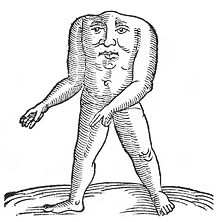Travellers' tales
The voyagers sometimes found--or said they found--strange and wonderful monsters, often beings half one animal, half another: dog-faced men, satyrs, men with one large foot they used to shade themselves. Compared to these, Caliban, half man half fish, is tame. Othello tells of his "travel's history":
Wherein of antres [caves] vast and deserts idle,
Rough quarries, rocks, and hills whose heads touch heaven,
It was my hint to speak. Such was my process.
And of the Cannibals that each other eat,
The Anthropophagi [cannibals] and men whose heads
Do grow beneath their shoulders.
(1.3.139-44)
Caliban: new peoples
Europeans were fascinated by reports of the new people, their reported savagery, and their seemingly idyllic nakedness. It was common practice for the voyagers to capture members of the native population, and bring them home to show--as Stephano plans to do with Caliban*.
Colonization and its attendant exploitation followed rapidly, though no English colonies* were successful in Shakespeare's lifetime.
Footnotes
-
Exploration and exhibition
"If I can recover him, and keep him tame, and get to Naples with him, he's a present for any emperor." Trinculo earlier remarks of the English that "When they will not give a doit [small coin] to relieve a lame beggar, they will lay out ten to see a dead Indian" (The Tempest, 2.2.68-70,32-33).
Martin Frobisher, who tried to find the Northwest Passage, brought back an eskimo family to Queen Elizabeth. They did not live long.
-
A brave new world
Sir Walter Raleigh founded an ill-fated colony on Roanoke Island in 1595; but the settlers disappeared. Raleigh also tried, and failed, to find the legendary El Dorado. His failure cost him his life, as he was executed under King James.
The Mayflower left for Cape Cod four years after Shakespeare's death.
